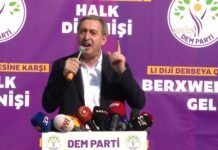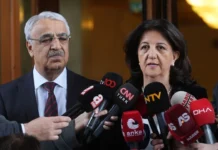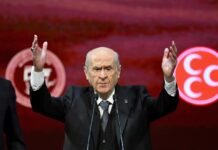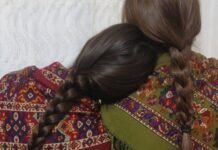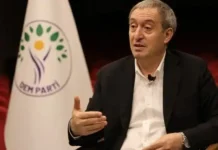Celebrations of Nevruz, a spring festival culturally significant for Turkey’s Kurdish minority, across the country have been marred by detentions and attacks targeting dozens, including journalists, Agence France-Press and Turkish Minute reported.
AFP video journalist Eylül Yaşar was among 75 people who were detained during the celebrations in İstanbul’s Yenikapı Square on Sunday. She was taken into custody at a checkpoint while preparing to film the event, AFP reported on Sunday, citing journalists and lawyers at the scene.
Yaşar was released after being handcuffed and held by police for more than six hours, along with another 14 people locked up in the same van.
The journalist said police subjected her to an “intrusive” and “brutal” body search and that she and the others being held in the van were called “pig droppings, terrorists and traitors” by the police.
Tuğçe Yılmaz and Ali Dinç from the Bianet news website, who were filming the detentions, also said they were beaten and thrown to the ground by police.
Turkish media reported Yılmaz’s claims on X that a police officer sat on top of her and throttled her for minutes in an attempt to detain her.
Members from the Istanbul Pride Parade Committee and other LGBT people also said they were subjected to “physical, psychological and verbal assault” on Sunday while they were trying to gather in Yenikapı Square to celebrate the spring festival.
Tunisian singer-songwriter Emel Mathlouthi was unable perform during the celebration since she was kept waiting at the door by the police for hours until the time allocated for the event had ended. Mathlouthi sang a short Kurdish song backstage.
Sezgin Tanrıkulu, an MP from the main opposition Republican People’s Party (CHP), submitted a parliamentary question to Interior Minister Ali Yerlikaya regarding the police violence and detentions at the celebration in İstanbul.
Tanrikulu asked the reason behind the detentions, multiple body searches and ban on reporting on the celebration. He also wanted to know whether the identities of police officers who mistreated the event’s participants have been identified and whether any administrative action has been initiated against officers who used violence against journalists.
DEM Party official among 35 detained in İzmir
Thirty-five people were detained during and after Nevruz celebrations in the western province of İzmir, according to a statement from the İzmir Governor’s Office on Monday.
While seven of them were detained during the event on Sunday, the remaining 28, including the pro-Kurdish Peoples’ Equality and Democracy Party (DEM Party) district co-chair, Leyla Tufan, were detained afterward on charges of disseminating propaganda for a terrorist organization by shouting slogans.
Meanwhile, a girl named Berfin, who has Down syndrome, fainted and was hospitalized after the police allegedly confiscated her Amedspor jersey during the Nevruz celebration in Kocaeli’s Darıca district. Amedspor is a football team from the predominantly Kurdish province of Diyarbakır.
DEM Party lawmaker Ömer Faruk Gergerlioğlu expressed outrage over the incident, stating, “This is shameful! You should be ashamed of your [lack of] humanity!”
It is common for journalists in Turkey, which has a poor record on freedom of the press, to face threats, physical attacks and legal harassment due to their work.
Turkey is ranked 165th in the Reporters Without Borders (RSF) 2023 World Press Freedom Index, among 180 countries, not far from North Korea, which occupies the bottom of the list.
Nevruz celebrations frequently become the target of criminal investigations for speeches that are made and banners that are displayed during the festivities.
In some cases, people were even detained over clothing featuring yellow, red and green, colors of the Kurdistan Workers’ Party (PKK), an armed group designated as a terrorist organization by Turkey and much of the international community.
Turkey’s counterterrorism laws are often criticized by rights groups and international observers for being overly broad, allowing authorities to interpret social affiliation as terrorist links and speech as terrorist propaganda.
Kurdish politicians and activists commonly face accusations of membership in or spreading propaganda on behalf of the PKK over their speeches, online commentary or attendance at events.
Many Kurds, who make up about a fifth of Turkey’s estimated 85 million population, say they face significant discrimination in the country.


